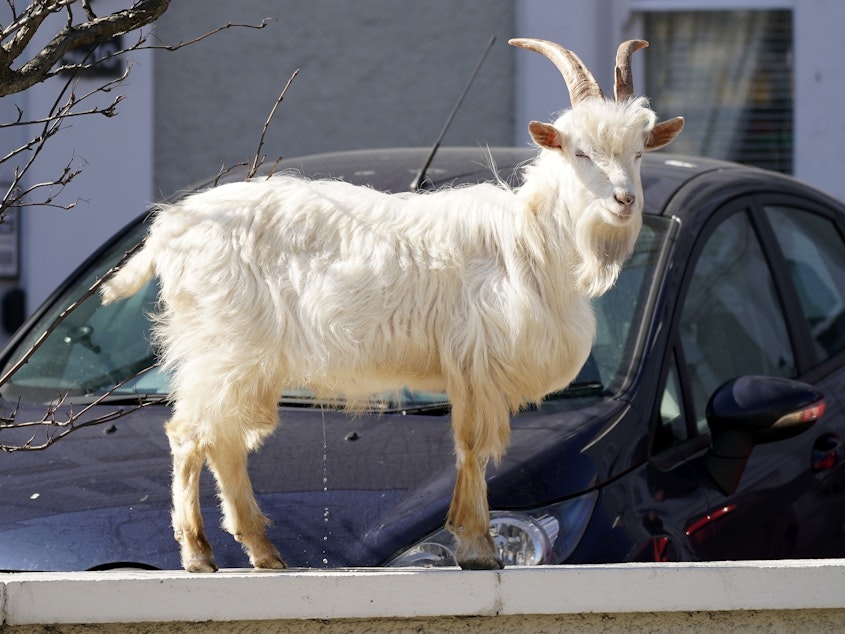An inflection point for GOATs: Please quiet quit these 'banished words' moving forward

When was the last time you called someone a GOAT? Or declared an "inflection point," or answered a yes-or-no question with "absolutely"?
Probably too recently, say the faculty of Lake Superior State University, the Michigan college that releases an annual list of words that they say deserve to be "banished" from our vocabularies over "misuse, overuse and uselessness."
"Our nominators insisted, and our Arts and Letters faculty judges concurred, that to decree the Banished Words List 2023 as the GOAT is tantamount to gaslighting. Does that make sense?" said Rodney S. Hanley, the university's president, in a very serious statement announcing the new list.
"Irregardless, moving forward, it is what it is: an absolutely amazing inflection point of purposeless and ineptitude that overtakes so many mouths and fingers," Hanley added.
Here's the full list of the school's banished words for this year:
GOAT
Inflection point
Quiet quitting
Gaslighting
Moving forward
Amazing
Does that make sense?
Irregardless
Absolutely
It is what it is
Out of over 1,500 nominations — from people across the U.S. and as far afield as New Zealand and Namibia — judges declared that this year's top offender was "GOAT," the acronym for "greatest of all time."
Nominators and faculty alike found the term objectionable due both to its impossibility – how can anyone declare a single best of all time when another may come along in the future – and the liberal way the title is dispensed these days.
"The singularity of 'greatest of all time' cannot happen, no way, no how. And instead of being selectively administered, it's readily conferred," said Peter Szatmary, a spokesperson for Lake State.
(In the spirit of full disclosure, a review of NPR transcripts revealed at least 17 candidates for the "greatest of all time" on our air in 2022 alone, including soccer players Pelé, Lionel Messi and Diego Maradona, the long-distance runner Eliud Kipchoge, the U.S. track Olympian Allyson Felix, the women's tennis star Serena Williams alongside a trio of her male colleagues Roger Federer, Novak Djokovic and Rafael Nadal, the quarterback Tom Brady, the hockey player Wayne Gretzky, NBA standouts Michael Jordan, Lebron James and Bill Russell, the surfer Kelly Slater, the video game Elden Ring and a Pakistani goat with very long ears.)
Lake State's faculty judges would likely argue that was too many people (and non-people) described as "the greatest of all time." "Words and terms matter. Or at least they should," Szatmary said.
Joining "GOAT" in banishment are nine other words and phrases that nominators and judges complained were used so often that they had become disconnected from their literal meanings – like "amazing," which nominators fretted no longer meant "dazzling" or "awe-inspiring."
"Not everything is amazing; and when you think about it, very little is," one nominator noted.
In a more serious example, some worried that overuse of the term "gaslighting" hurt the word's ability to describe a specific type of dangerous psychological manipulation. (Lookups for the word's definition were up more than 1,700% in 2022, Merriam-Webster said when it announced "gaslighting" as 2022's word of the year.)
Hundreds of words and phrases have been "banished" by LSSU since 1976. Over the years, LSSU has received tens of thousands of nominations for its annual list.
Frequently targeted are of-the-moment phrases like "in these uncertain times" (as so many COVID-related messages began in 2020), "information superhighway" (banished in 1995) and "filmed before a live studio audience" (such a vice it was banished twice, first in 1987 then again in 1990).
Joining them are common linguistic bugaboos – frequently misused words like "impact," redundancies like "exact same" and "completely empty," or overly verbose phrases like "at this point in time." ("Why not say 'now,' or 'today'?", a 1976 nominator asked.)
Others have been words and phrases that are genuinely offensive. For 1982, a mother encouraged the banishment of the word "retarded," writing that her daughter with a mental disability would, "with proper stimulation ... be able to learn and to understand much more than we believe possible." [Copyright 2023 NPR]
